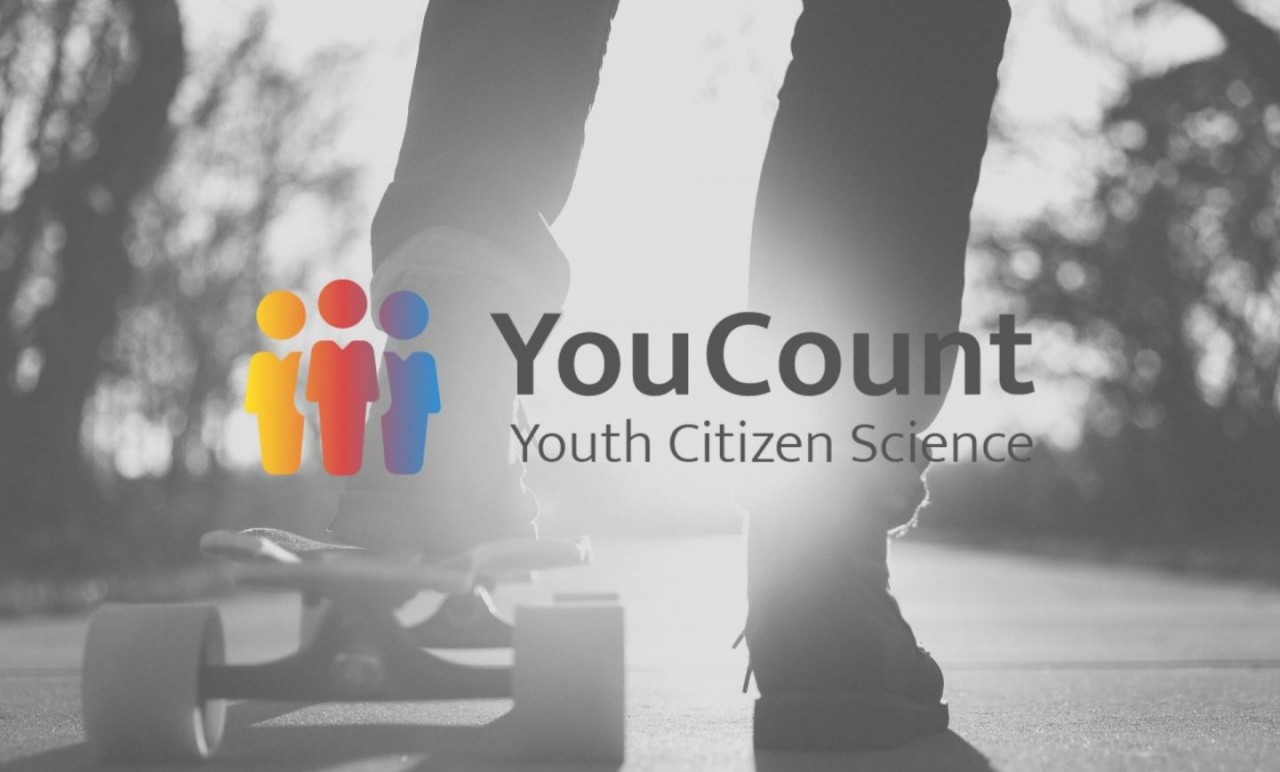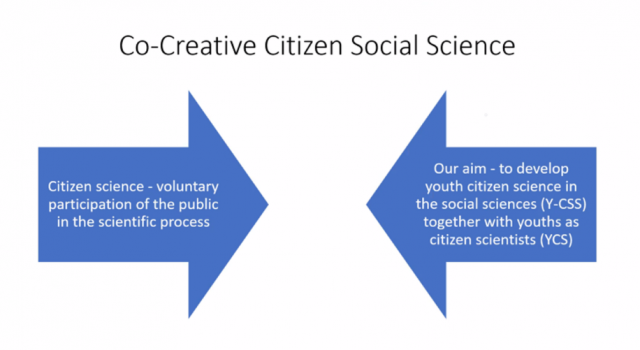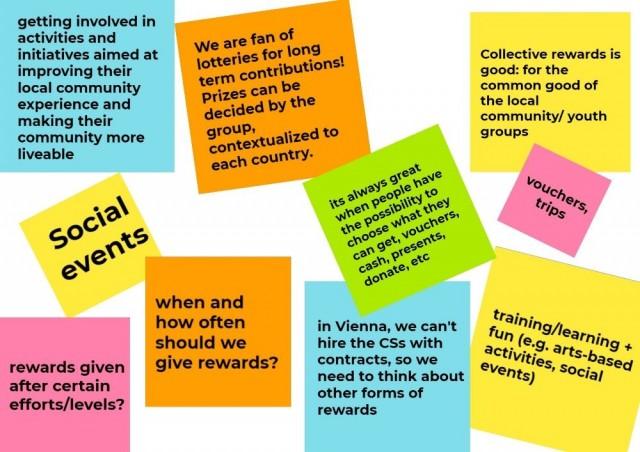In YouCount, youths from nine European countries will participate as citizen scientists in case studies addressing their lived experience of social exclusion and inclusion. As their contribution is essential to the research, there is a genuine need to discuss their rewards and compensation: How to avoid any kinds of exploitation of young citizen scientists?
How should we reward their work? What kinds of rewards should we use? How can we reward an originally volunteer activity? What will constitute a fair solution in the local cases and across the cases? How should we design and develop the SPOTTERON citizen science application?
Source: Image derives from Julie Ridley's presentation, YouCount consortium meeting (27.05.2021)
Eager to learn and find a good solution, YouCount partners have embarked on a discussion during our consortium meeting on 27 May 2021. First, YouCount WP2 leader, Julie Ridley (University of Central Lancashire) presented the findings of an internal survey on partners' expectations and ideas about fair rewarding as they see it in their local cases. Via this internal survey, the majority of the project partners propose and prefer a fixed reward to their local youth collaborators. Partners expressed their preference for an early engagement with the young in order to deliberate together on the best, fairest, and most motivating rewards to be employed locally. Many other ideas for reward emerged including, among others, a lottery for a big prize where every youth has equal chance for winning; vouchers for cultural events; gifts like mobile phones, etc. The YouCount research team will also invite university students and ideas for their compensation include recommendation letters, letters of reference for future employers, access to other projects, academic activities, scholarships.
Another useful input was received from YouCount WP1 leader, Eglė Butkevičienė (Kaunas University of Technology) based on an extensive review of the relevant literature on rewarding citizen scientists and volunteers in research. There is ambiguous evidence that money does not motivate volunteers, thus the potential of crowding out genuine motivation and satisfaction to participate by monetary rewards cannot be ruled out. The findings and insights from previous research on how to motivate citizen scientists to include the provision of training or educational opportunities related to the research, discounts and vouchers in local shops, gifts, certificates, an acknowledgement from a local decision-maker, reimbursement of travel expenses, offer of a mentorship opportunity, etc.
Source: Some ideas we collected during the meeting.
Finally, YouCount researchers also discussed how to adapt the SPOTTERON application across the local cases: How should researchers use the application to engage youth? What kind of data youth citizen scientists should provide on the application? What kind of data should researchers collect to increase knowledge of positive drivers to social inclusion?
Although YouCount researchers have not yet reached a common conclusion, they addressed some shared directions and insights. Aiming at both qualitative and quantitative data collection, researchers should design and develop applications with the participation of youth citizen scientist and according to their local needs. Collected data via the SPOTTERON app might focus on their lived experience that allows youth to reflect on their social encounters. Reaching these initial objectives certainly does not remain without complications.
Aina Landsverk Hagen and Ingar Brattbakk (Oslo Metropolitan University) introduced practical examples of documenting place-based observations from the 'Alternative spaces: Youth participation' (2016-2019) project. In Oslo, youth citizen social scientists gathered multiple data in different formats, applying analogue and digital tools. To collect thicker datasets, they marked locations on the application's map, took pictures, used symbols and added text. The advantage of technology-mediated observation is that immediacy can be creatively researched. Youth citizen social scientists could record their emotional, visual, sonic, and odour perceptions and interpret their inputs within the research context. Aina and Ingar highlighted that such an app needs to be integrated into the research design from the very beginning to benefit from all the advantages of the tool.
Reidun Norvoll (Oslo Metropolitan University), consortium leader, identified potential practical and research challenges in forging an inclusive research design. Practicalities involve adapting technical devices, such as mobile phones, which will be used either privately or within groups. This raises the question of ownership and further expenses when more devices need to be purchased. Ethical dilemmas arise focusing on how to use the application itself and organise visual documentations without violating the European Union's General Data Protection Regulation. As framing the research design, data quality and data management on the application became fundamental. YouCount researchers need to integrate SPOTTERON-generated 'thick data' from the visual documentation into the overall research design, complementing other research methodologies, such as focus groups and interviews.
In sum, YouCount partners have become more aware of the challenges of rewarding research collaborators, but the discussion, particularly regarding how to find a fair solution that balances the specificities of local contexts and cross-case expectations is thus continuing.
Would you like to read more on this topic? Here are our main references:
- Chabot, C., Shoveller, J. A., Spencer, G., & Johnson, J. L. (2012). Ethical and epistemological insights: A case study of participatory action research with young people.Journal of Empirical Research on Human Research Ethics, 7(2), 20-33. Doi:10.1525/jer.2012.7.2.20
- Hardy, L. J., Hughes, A., Hulen, E., Figueroa, A., Evans, C., & Begay, R. C. (2016). Hiring the experts: Best practices for community-engaged research. Qualitative Research, 16(5), 592-600. doi.org/10.1177/1468794115579474
- Newman, G., Hmelo-Silver, C., Huang, J., & Singer, A. (2017). Combining participatory modelling and citizen science to support volunteer conservation action. Biological Conservation, 208, 76-86. doi.org/10.1016/j.biocon.2016.07.037.
- Ponciano, L., & Brasileiro, F. (2015). Finding volunteers' engagement profiles in human computation for citizen science projects. Human Computation, 1(2), e245-e26. doi.org/10.15346/hc.v1i2.12. Gray, S., Jordan, R., Crall, A.,
- Purdam, K. (2014). Citizen Social Science and Citizen Data? Methodological and Ethical Challenges for Social Research.Current Sociology, 62, 374-392.
- Reich, J., Liebenberg, L., Denny, M., Battiste, H., Bernard, A., Christmas, K., & Paul, H. (2017). In this together: Relational accountability and meaningful research and dissemination with youth. International Journal of Qualitative Methods, 16(1). doi:10.1177/1609406917717345
- Resnik, D. B., Elliott, K. C., & Miller, A. K. (2015). A framework for addressing ethical issues in citizen science. Environmental Science & Policy, 54, 475-481.doi.org/10.1016/j.envsci.2015.05.008
- Shamrova, D. P., & Cummings, C. E. (2017). Participatory action research (PAR) with children and youth: An integrative review of methodology and PAR outcomes for participants, organizations, and communities. Children and Youth Services Review, 81, 400-412. doi:10.1016/j.childyouth.2017.08.022


